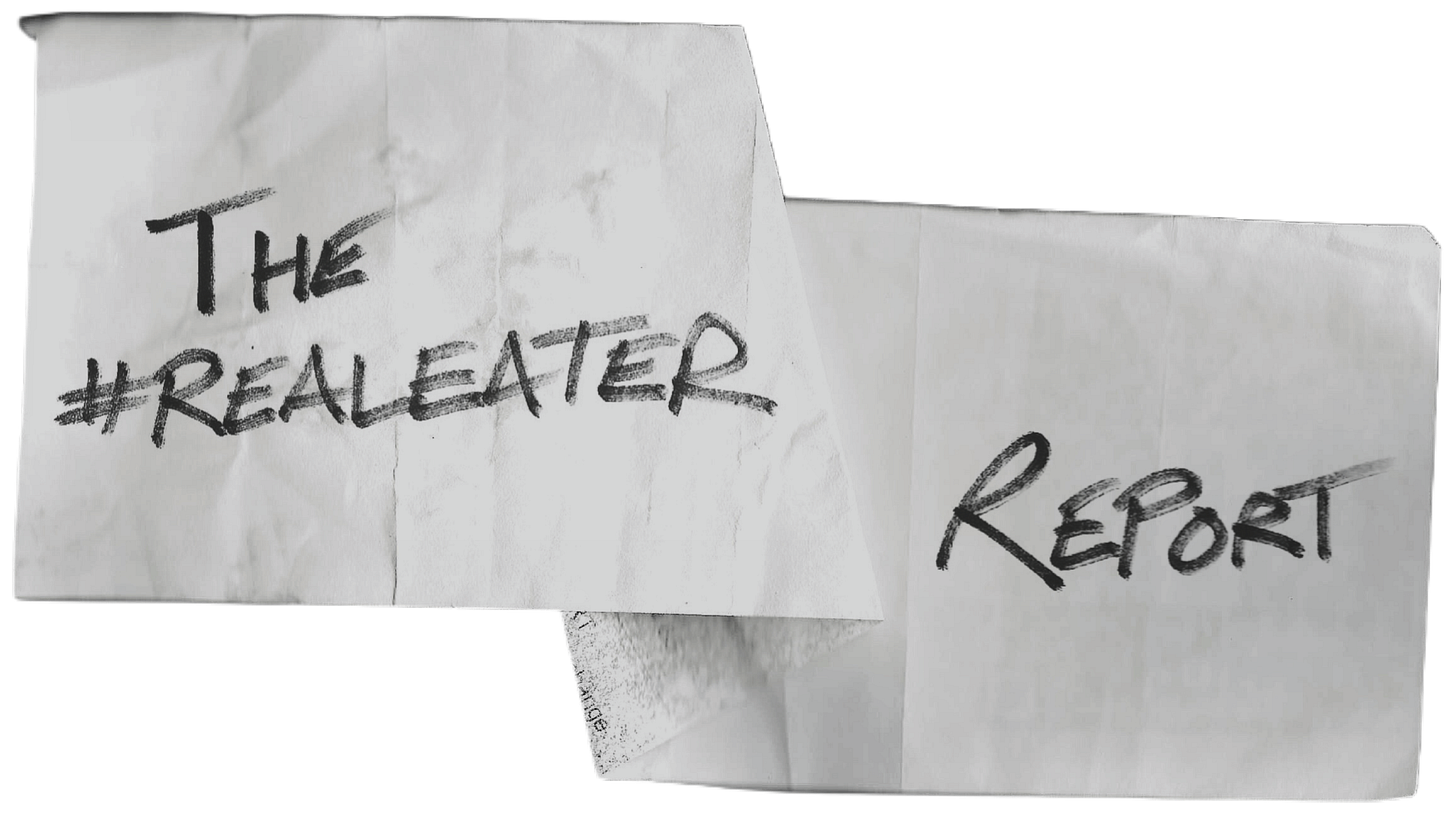There’s not much I have to say about the events of the last few weeks not gonna lie. My brain has short circuited a little bit to be fully honest. All I can offer once again is my favorite monologue from one of my favorite films, which gets more relevant by the day. When we keep accepting the lowest common denominator, that’s what we get. Other than that, this edition has thoughts on our collective arrested development, a review of one of the best sandwiches I’ve had in months, and hammering out my spring wardrobe early. Hope you enjoy and as always thank you for the support.
-ms
Table of Contents
“Smells Like Young Adult Spirit”
Recent Pieces
The #RealEater Report
Gerecore
Refer my newsletter to some friends to unlock a few months for free and get access to the full archive!
⫘⫘⫘⫘⫘⫘⫘⫘⫘⫘⫘⫘⫘⫘⫘⫘⫘⫘⫘
A Word From Our Sponsor
⫘⫘⫘⫘⫘⫘⫘⫘⫘⫘⫘⫘⫘⫘⫘⫘⫘⫘⫘
Life is weird as a Young Adult in the 2020s. Recently, I’ve really been wrestling with frustrations about a few different factors that make up what I think it means to be a certain age during this time. A specific, modern type of angst that’s hard to articulate, but very easy to feel. It’s not something we were prepared for, because I don’t know if people could have predicted it lasting this ling. I’d normally try to wrangle all of these ideas together into one giant essay, but the nature of our present feels a lot more disjointed than that. I wanted the format of these feelings to match how they arrived. Scattered, roughly categorized, and additive. Consider it a group of passing trains of thought.
Nostalgia
I spent most of my childhood in the 2000s wanting to grow up. I couldn’t wait to be free of the constraints placed upon children by less caring adults in their lives. I was a serious kid, and kids weren’t meant to be taken seriously. I was always jealous of the classmates I saw around me that seemed free of whatever invisible weight happened to be bound to my shoulders prematurely. I hated the plastic of youth, I desperately craved the metal, the wood, the glass of adulthood. I still enjoyed Spongebob and Billy & Mandy like everyone else, I still engaged in being a kid, with all the coming-of-age moments along the way, because I knew they were important, but deep down I always felt a sort of solace in the fact that one day I would be bestowed with the agency that age brings you. My scope of life would expand in ways I couldn’t even conceive of yet, and I wanted to be first in line. I had a vision of what my 20s would look like in my head since I was 8 years old, and I’ve done damn near everything in my power to make that a reality (save some minute details like the Simpsons arcade cabinet in my penthouse apartment, still need some time on that). I never had a fear of peaking in high school, because I knew I had barely even begun towards where I wanted to end up. I dreamed of being the age I am now, and there were times along the way that I wasn’t so sure I’d make it here. Despite whatever good memories I had from growing up, I was always excited to move on, move forward. Deep down, maybe sprinting towards the future was me running from the past, desperate to remove myself from a period of time I felt anxious, out of place, without control, or not taken seriously. Maybe I was tired of the synthetic, nauseating feelings of the Y2Ks and Frutiger Aeros of the time, ready for something real. Maybe out of naiveté, I had hoped that when I finally became an Adult, that it would feel so remarkably different to when I was a kid that it would be the great release I’d been waiting for. That I and all my peers could settle into our place as the new Adults, the critical thinkers that settled and learned from our past, ready willing and able to now focus on our present and our future. I’d finally see and feel the results of all the awkward tumult of growing into that invisible weight on me. So imagine my surprise when I finally arrived into adulthood and found that everyone wants to talk about how great things were when we were kids.
I’ve written about the narcotic potency of nostalgia quite often so I’ll try to keep it brief, but for the sake of this piece, I need to establish that our obsession with it, some golden collection of ethereal memories that we continue to milk dry for everything it’s worth, is a symptom of our delayed growing up. What was once meant as a small, bittersweet occasional treat for the brain, something we feel when our memory digs up a bit of gold from our past, is now the standard mode of operation. Labels, studios, brands from large to small all seem focused on harking back to a time we know we can never get back, but still try anyway. The infamous slogan “Make America Great Again” and the rallying idiots behind it serve as a perfect summary of this phenomenon, a whining call for a return to something that never truly existed, an amalgamation of scattered symbols loosely tied together to represent feelings that one isn’t emotionally mature enough to express coherently. Not everyone has the same past they’d like to return to, but the ubiquity of wanting to escape backwards seems to be inescapable. We become so preoccupied with recapturing the past that we forget or disregard the present and the future, because they seem hopeless to us. We have become obsessed with preserving such a rigid sliver of time, stripping every and all pieces of substance from it off the bone. As a result, we have tapped our nostalgia vein out, and built up an incredibly unhealthy dependence in the process. I’m not above reminiscing with friends about fun times we had or revisiting a classic show from way back when, but I really thought there would be more people ready to join me in moving on, moving forward. I’ve recently realized that this is about more than just a fetishization of what we imagine the past to be, but rather a coping mechanism, a childhood relic like a pacifier that we carry with us as the world moves blindingly around us. That same feeling I had as a kid has chased us all into our adulthoods, the sensation of not feeling in control. This has only been accented and compounded further by the lingering effects of the pandemic, a time when total uncertainty and tumultuous instability made countless people cling to past, reliable sources of solace. It appears that those habits of comfort consumption we picked up in 2020 stuck around longer than any of us anticipated. We still cling to our pacifiers even half a decade removed from that time. Additionally, due to economic reasons, again out of our control, adulthood isn’t distinctly defined the same way for us as it was in the past. We weren’t given the same signifiers and tools of adulthood that previous generations did. We have gigs not careers, we rent instead of own, everything is fleeting, transitory, disposable, constantly in a state of flux and rapid motion. We are left without the once concrete temporal landmarks of growing up that our parents or grandparents had, instead left to synthesize our own through our own determination and judgement. We are in charge of defining what being an adult means, sometimes for better, but just as often for worse. As a result, everything at a certain point can begin to bleed together into one giant hazy chunk of indiscernible time. A purgatory of arrested development known as Young Adulthood.
Fandom
As more and more of us are trapped in this state of stagnation, it makes sense that fandom, something typically defined and pursued strongest by high schoolers and college students, has taken the forefront as America’s new national pastime. To clarify, I don’t mean being a fan of something, but rather the rabid, entitled, gluttonous post-Marvel, post-Stan-Culture, post-IP-slop ecosystem that has created an entire sub-economy based around Fandom. A celebration of the consumption itself. Podcasts, youtube channels, endless merch and bootlegs and other commodified versions of signaling, decorating, and insulating yourself within your interests. Particularly because of social media, everything under the sun, regardless of nuance or depth or sophistication, can be flattened into not much more than a logo to label yourself with. More than any other generation, we have used our fandoms to define ourselves and craft our personas, branding ourselves with our choice of association, reinforced even further by social media and the “starter pack” of it all. You have to show off that you’re into Yohji Yamamoto and natural wine and obscure music and other good, smart hobbies, lest you be mistaken for some plebeian, because there isn’t any other evidence beyond the surface to stop that from happening. Even in the realm of politics and theory we see the lingering effects of Fandom on how we consume. Everything on the political spectrum from alt-right chudsmanship to self-proclaimed communism can be, and often is reduced to essentially a sports rivalry. What team are you a fan of? Actually being informed, opening yourself up for self reflection or examination, thinking critically, or translating theory to praxis is way more difficult than simply marking yourself as on a proverbial side, and we see what route people prefer to take every day. At a critical time in our lives, where infrastructure is being demolished by the day and evil is in full control throttling us towards hell, instead of arming ourselves with information or powerful art or lessons from history, we choose imaginary superheroes. Our frames of reference for morality and the immense, complicated grey areas of life come from Star Wars and cartoons. It’s very telling that the primary rise in regressive “anti-woke” sentiment the past decade originated not from any form of critical theory, but incoherent whining from pissy video game fans. The relationship between our obsessive, unhealthy fandom of fandom and our drawn out adolescence might lie somewhere between cause and symptom. We feel trapped between child and adulthood, so our interests, as well as how we engage with them reflect that ambiguity.*
*(Another example of this would be the prudish shift of the general public against things like sex scenes in movies, directly reflecting a gradual puritan ear-plugging YA-novel self-infantilization attitude towards art, while at the same time, an alarming number of men (but not just men) rapidly grow more porn-brained and sex obsessed like hormonal teenagers. We are stuck in different polarized forms of perpetual adolescence without reaching actual maturity in any direction.)
It’s been hard to put into words why I’ve been feeling a sort of disconnect to some of the things I know I’m passionate about the last few months, and I think seeing the fandom effect permeate through any and all forms of enjoyment might have something to do with it. For the first time in years, I found myself tinged with a wave of acute embarrassment by the things I like. After being fed more of the same for the 10,000th time, the same retreads of what we’ve already seen, the same cash grab slop, the same superficial celebration of consumerism, something like being “into clothes” for example felt more like being a Marvel fan by the day. Eerie parallels of key-jingling dopamine feedback through self-fellating nostalgia and surface level mindless consumption. The commodities that were supposed to inspire desire, even the one’s I liked, began to just feel like Funko Pop figures for Travis Scott fans because of the way they have to be digested now. The churn of the machine gets nauseating when you step back to look at it. When it starts to feel like the only excitement or stimulation from a hobby comes from a synthetic desire to buy more shit, usually in the form of something we’ve seen hundreds of times pushed as the cure to restore some feeling, it gets boring fast. I realized it’s not for a lack of good stuff out there, I could scroll on any number of e-shops or peruse collections and easily find something I like, but rather the way people talk about or interact with these interests that has been making them feel I guess distasteful. Our relationship to our interests, and in turn how we consume them, has mutated in a very brash way. Similar to how a child would deck themselves out in branded gear for their favorite Pixar movie, we become a poster for signaling our taste, removing any allure of mystery or discovery and falling into archetype. Like everyone else, I love matcha and nice fitting pants and jazz music and cult movies, but I never want to make them the basis for synthesizing a personality. That’s something I was meant to get out of my system in college and mature from. It’s a big reason why I don’t participate in any logging websites based around touting one’s own Good Taste. It’s all started to feel deeply performative in a way that I believe starts to take away from the actual experience of enjoying something. Pimping one’s own (alleged) passions, the things you’re supposed to hold dear, out for some ulterior motive. Crafting a persona that feel’s like a cheap impression of authenticity or depth. You can even look at the way people talk about love or being a nerd or other things that are quite literally supposed to exist organically internally, instead treated as cheapened decoration to desperately signal that they must be true. It shouldn’t be a surprise then when people’s understanding of or behavior relating to these things matches the superficiality of their treatment. I’m not saying I or my interests are some bastion of patrician taste, but I do think the way any of us consume any passion or hobby has warped in real time in a very significant way, and deserves to be critically assessed and analyzed by us for our own benefit. Maybe it’s pretentious to think so, but I’m of the belief that the “point” of digging below the mainstream, or truly connecting with our emotions, or seeking out the things that potentially have more enriching experiences to offer than what’s simply presented to us, is to treat them with the respect they deserve. If we wind up wielding those same supposedly “deeper” or “niche” interests as some cheap signifier to try and “sophisticate” our personas like the cultural version of a McMansion, if we treat and talk about challenging art in the same way we do the vapid shlock, what’s the point of differentiating between them at all?
Bloat
Another notable byproduct of our immature, pacifier style consumption habits is the sheer amount of things we consume on a daily basis. It’s ironic that in periods of economic instability, we choose to maximize instead of shrink. When quality becomes more valuable, we gravitate towards quantity, maybe thinking it provides a kind of unconscious psychological certainty, a feeling of having versus one of not having in a slow period. Additionally and obviously, things like social media, streaming, online shopping, and food delivery also all play factors in just how much we ingest during a typical day. As a result, the scale has to match, and it creates a dangerous codependent relationship between production and consumption. We get more, so we want more, so they make more, and so on. Bigger has mistakenly become synonymous with better, scale with efficiency, while things like brevity or restraint or dare I say curation fall to the wayside. We see this bloat problem manifesting all throughout media. Albums with tremendous, hulking runtimes serve to appease the algorithmic streaming deities. One massive tanker of a film absorbs 10+ movies’ worth of budget in order to try and make the biggest ROI possible as well as pay The Rock 50 million dollars for some reason. Literal tons of landfill bound clothes in giant collections by both fast and slow fashion brands are produced to sustain the ever-important “trash garms” ecosystem. I’ll save the rant about the fucking trucks because you already know what I’m talking about.
With our attention spans shrinking exponentially, with countless bite size bursts of information and Content filling up our days, it creates an insatiable hunger that can only ramp up. We always have to be doing something, we can never afford to be bored. This is again reflected by our ability to constantly distract ourselves through our media of choice. The same people that grimace at the idea of a 3+ hour narrative movie will gladly sit down and enjoy a 5 hour Youtube video entitled “The DARK History of Phineas and Ferb: What Went Wrong?” or spend 2 hours scrolling through short videos on Tiktok or IG. It’s apparent that the problem people have isn’t with long periods of consumption, but rather long periods of digestion. It’s much easier to burn through time when it’s mindless and passive instead of something that needs you to actively engage with it. We don’t allow ourselves the time to feel hungry before we start to eat again, because we derive our dopamine and pleasure from the consumption itself instead of the results of it. The action has become entirely separated from the purpose of it, and it has created a disconnect between the two. As a result, instant gratification becomes the top priority, blinding us to the potential higher reward or fulfillment of something more worked for. Through the sheer glut at our disposal, we have somehow retroactively made ourselves iPad kids, craving comfort through stimulation, with endless choices for our own personal Cocomelon. I am certainly not innocent, I’ve found myself mindlessly scrolling on my phone during a particularly slow part of a movie, (at home mind you have some fucking manners) or taking “email breaks” when I’m trying to read. I, and I would hope others, have recognized this as probably unhealthy in the long term, and have started to think about how to correct, or “detox” from, this level of consumption. I’ve started trying “experiments” in different counters to all this bloat, which has manifested as essentially the media and informational equivalent of intermittent fasting. Tests in trying to simply consume less. No phone use before I read with my morning coffee, a day without headphones to absorb more ambient life noise and leave myself more open to interaction, and most importantly, barely using X (the everything app!) FKA Twitter. I have to say, I’m happy with the results so far.
Communication
While I’m on the subject of the site that has become the run down outlet shopping center of the internet, it’s essentially the epicenter of how our frozen state of un-adulthood has drastically poisoned how we communicate. It really is remarkable how much can change over the course of 2 years, and how those changes can retroactively make the entire “project” of social media feel like a net mistake. As someone who has made a career through social media, whose livelihood is directly tied to and interwoven with it, I’ll admit it’s honestly surprising how embarrassing it feels to have ever cared about it at all if this is the natural progression of it. It’s hard not to look back at previous embracing of it and cringe just a little bit. For a minute I truly believed that progress was on the horizon, that we had finally found the proper tool of our generation to learn from past mistakes and move forward with the information now at our fingertips to upend the way things used to be with new ways of doing things, new approaches, new thinking. Maybe that was my own childish naiveté.
We speak to each other so recklessly now. Things that in prior decades might (and probably should) stay murky, cruel thoughts that bounce around one’s head until they fade out of impulse are now barked at each other and carved in the digital marble. It makes it a lot harder to self-question or reflect when something is stated for dozens, hundreds, THOUSANDS of people to see. In a time where you are now chained to your words and faced with the responsibility of carrying them around with you, one would assume that we would be more careful or precious with what those words are. But the relationship is in fact the inverse. The experiment of social media has shown that people would much rather invest their effort and energy not into reflection or care over their words when they are thought up, but in priming the defense of whatever those words may be. Doubling or tripling down on their stubborn, often flagrant outlook rather than risk a chance of bruising their ego in admitting they were misguided, or misinformed, or outright antagonistic. An adolescent attitude of not just needing to be vindicated in an argument, but needing to condescend at the same time. Much like a child. Hope that helps!
There’s a sort of remedial “back of the classroom” humor that has gradually made its way (back?) to the forefront of how we communicate that’s hard to properly articulate unless you see and feel it. Reminiscent of those shitty non-Wayans parody movies from the mid 2000s, it serves as a perfect indicator of this further backslide into adult juvenility, not just in the frankly stupid and viscerally unfunny nature of it, but in how it has been championed as a rousing return to the “pre-woke” Good Ole Days when you could openly make fun of developmentally disabled people and hate queers, because that’s what free speech is all about. I would argue that this sense of humor is a direct symptom of our purgatorial state of immaturity. An odd blend of not-quite-Reddit and not-quite-4chan, a location-less dialect equal parts condescending and ignorant that has been trapped in internet amber for over a decade. Distinctly Millenial yet still infiltrating the vernacular of Gen Z, creating a sort of Uncanny Valley effect of cringe. Sort of like the type of person that still gets excited by Kanye antics in big 2025. The dumbest person you know that reveals more by what they think they know than what they actually do, a kind of anti-Socrates. A dangerous brand of stupidity that conflates blind contrarianism with intelligence like a 13 year old arguing for the sake of a reaction. The main issue is instead of being relegated to online message boards and 6th grade classrooms like it once was, this brand of stupidity now runs the country. Both we and the way we communicate with one another seem to refuse to evolve or grow past a juvenile level, or what we’ve already experienced, even going so far as to chase the opposite direction. Any growth can easily be written off as woke and undone as we are further burdened by people dragging rotting, nostalgia bloated corpses of "the way things used to be” with them into the future. A population of people with the rage and violence of adults but the tendencies and vocabulary of children. Is this what we’re stuck with for the decline of civilization? Shitty puns, contrarianism for the sake of it, and mangled bot-speak?
Irony
As we have seen, the lasting effects of the Long 2011 and the Long 2016, particularly on the internet, have burrowed their way into a staggering number of people’s collective behavior. Whether it’s suckling right wing losers remaining crystalized in the era of greentexts and doge memes, or “savage/shady clapbacks” neoliberals, something about that period of time has stayed as a spectre deep into the 2020s, certainly much longer than the attitudes of the Bush years did into the 2010s. I believe this is because of not just that same perpetual immaturity or refusal to grow, but because those two eras were massive critical points in the foundation of meme language, the basis for how nearly all of us communicate today. Our foundational reference points and icons weren’t works by Homer or Shakespeare or Tennessee Williams (those were relegated to boring homework), but Rage Comics and Macro Images. (As an example, the “the curtains were fucking blue!” meme shared ad infinitum during that time basically carved out and still serves as the basis for the prevailing anti-art arguments of today.) Importantly, this was also major shift from modern to post-modern, from genuine beliefs to the age of irony and trolling.
If our reckless, insatiable consumption and obsession with nostalgia serve as our proverbial pacifier, then our wall of irony is our security blanket. Our vulnerable, authentic sincerity is cloaked in layers and layers of scrutiny-deflecting irony in order to cope with the sheer amount of eyes on us at any given moment. We craft our personas with emergency parachutes just in case we need to abandon them at a moment’s notice. Our authentic selves are replaced instead with the cold, detached impersonality we witness all over the digital world. It is no surprise that there is a growing lack of empathy in our lives now, and it is harder to relate to our fellow people, because through this armor we have constructed, we have sacrificed bits of our humanity in the process. When the time comes to finally reveal and use that sincerity we have neglected for so long, we may find that muscle has atrophied without regular exercise. Even the aesthetics of our time reflect this terrifying detached attitude. The fascism of 2025 arrives in the form of gruesome wojaks and barely coherent stale memespeak, equal parts grotesque and childish. We let it float by unchallenged because it was presented as immature or not to be taken seriously, until it got very serious, very fast. If the Reagan era was defined by the cruelty of grown men, the Trump era is the consequences of raging, thrashing children.
It’s hard to be sincere out here.
Growing Up
In all honesty, it’s understandable why all of this is happening, why we are reverting to childish versions of ourselves in times of distress. Every morning there’s some new sinister imagery to take in, some new food recall or infrastructure breakdown or schizophrenic conspiracy theory or economic slide or human rights nightmare. News can feel equal parts terrifying and discouraging, and trying to piece together humanity from the detritus of the average internet comment section can feel like throwing back a shot of nihilism straight. Where are we to go, what are we to do, who is there for us? Constantly being careened and rattled around into a state of defeated submission is the goal they want, so more and more things can innocuously slip past. Trying to stay vigilant or informed in this rancid time is like trying to grab a speeding rope. The harder you strain to clutch it as it whips by you, the more it violently sears until eventually you recoil, lose your grasp, and let go. We feel closer to the end of something rather than the beginning, so we cling harder and harder to things that remind us of that beginning as it shrinks in our rearview mirror. We try as best we can to inflate and revive things back to what we once knew them to be, despite deep down knowing that trying to re-live something is in vain. What we wind up with is a warped visage of what we remember, synthetic versions of organic things we once had, cheapened and diluted.
But the only way forward is through. We can only use the tools we have available to us, and by remaining trapped in this endless cycle of nostalgia and infantilization, that amount of tools will never grow. If we fixate so much on spoiling our inner child, we incidentally begin to neglect our inner adult. It’s something I’ve personally been grappling with when it comes to issues I’ve carried with me since my adolescence. The baggage that weighs you down that you secretly don’t want to let go of because it reminds you of your youth. Things like insecurities surrounding my own introversion have followed me my entire life, and I know that eventually, habits begin to calcify over time, becoming harder and harder to break until they become set in stone. I never want to be so stuck in my ways that I can’t change, or grow. In order to do that, sometimes that means putting the comfort blanket away and risking being uncomfortable. There’s a reason the expression is growing pains. It’s a lot of work, but as we’ve seen, it’s necessary work. There is only so far obsessing over childhood snacks and cartoons and “simpler times” can get you. Only so long we can cling onto the relics of our old beliefs, continuing to naively give benefit of the doubt where it’s no longer deserved. At a certain point, our spine needs to solidify. Someone has to be the new adults.
⫘⫘⫘⫘⫘⫘⫘⫘⫘⫘⫘⫘⫘⫘⫘⫘⫘⫘⫘
Recent Pieces/Mockups
Available at hello@marksabinodesign.com
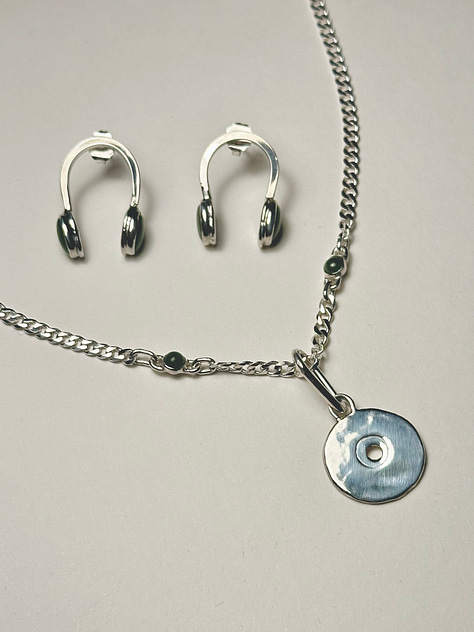
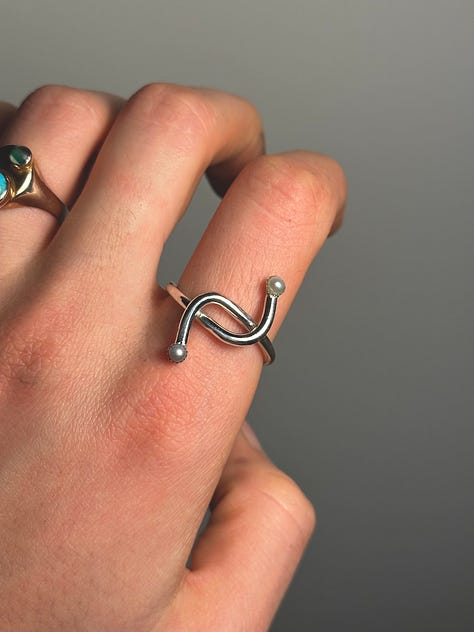
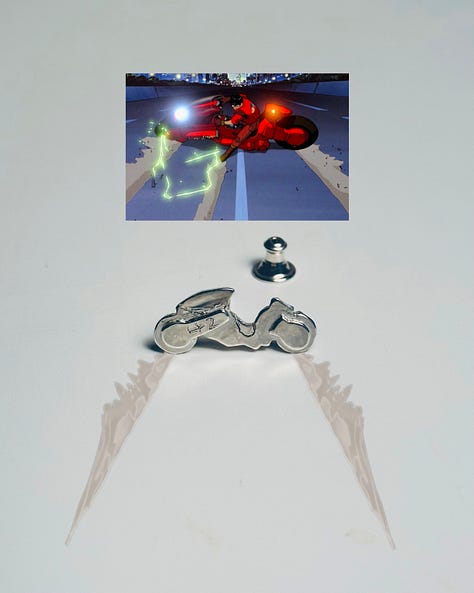
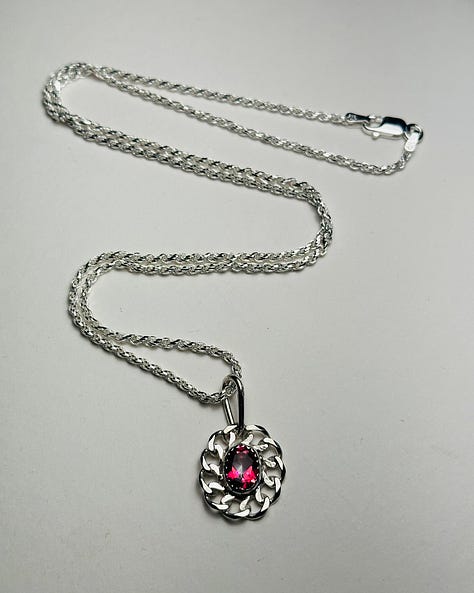
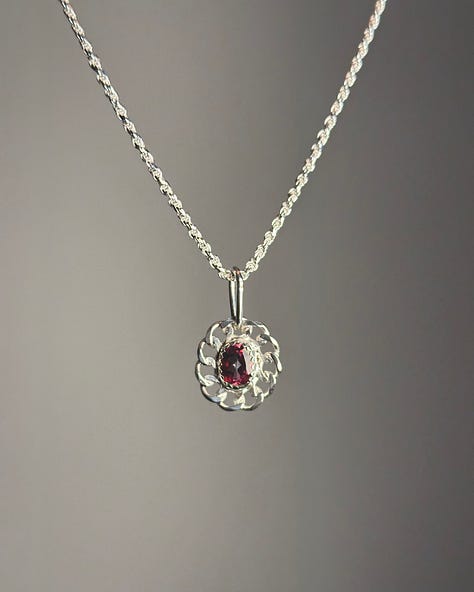
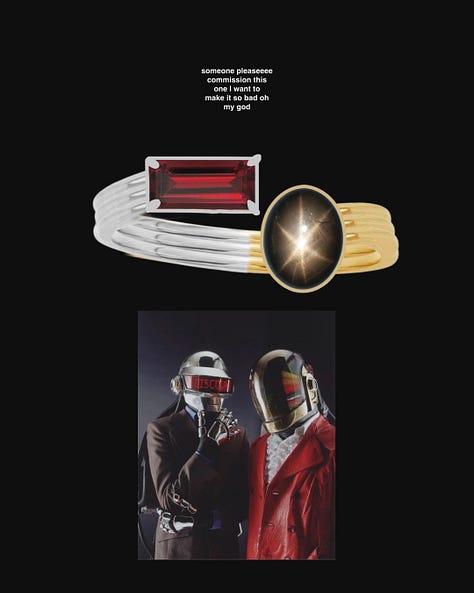
⫘⫘⫘⫘⫘⫘⫘⫘⫘⫘⫘⫘⫘⫘⫘⫘⫘⫘⫘
Food to me is one of life’s most reliable joys. Whenever I feel down, or stuck, or that things are spiraling, it’s remarkable how much a good meal can reverse. The right burger, or French onion soup, or bánh mì is like my own personal reliable “break in case of emergency” for a shit mood. The social media age of food and “Foodies” however, has introduced a completely new landscape. I’ve voiced my feelings about bowls already so I’ll spare that for the sake of time, but in short, there’s a lot of slop out there. This makes finding (and maintaining) a good spot way more valuable, especially now with how fast information can travel and ruin a good thing you have going. I, like many others, walk the fine line of gatekeeping a food spot in order to maintain the experience of it. Sure the food may still be great, but a long ass line of people who found something on Tiktok will quickly throw a once valiant, shining eatery out of my rotation until things die down. As an experiment to try and counter this, I want to embrace gatekeeping while still showing love to great meals around the city. These reviews will mention the food, the ambiance, the experience, even the location, everything except the name of the place I got it. It’s up to you to piece the clues together like geoguessr if you really want it enough. To be honest, they should be pretty easy to find, but hey let’s have some fun fuck it.
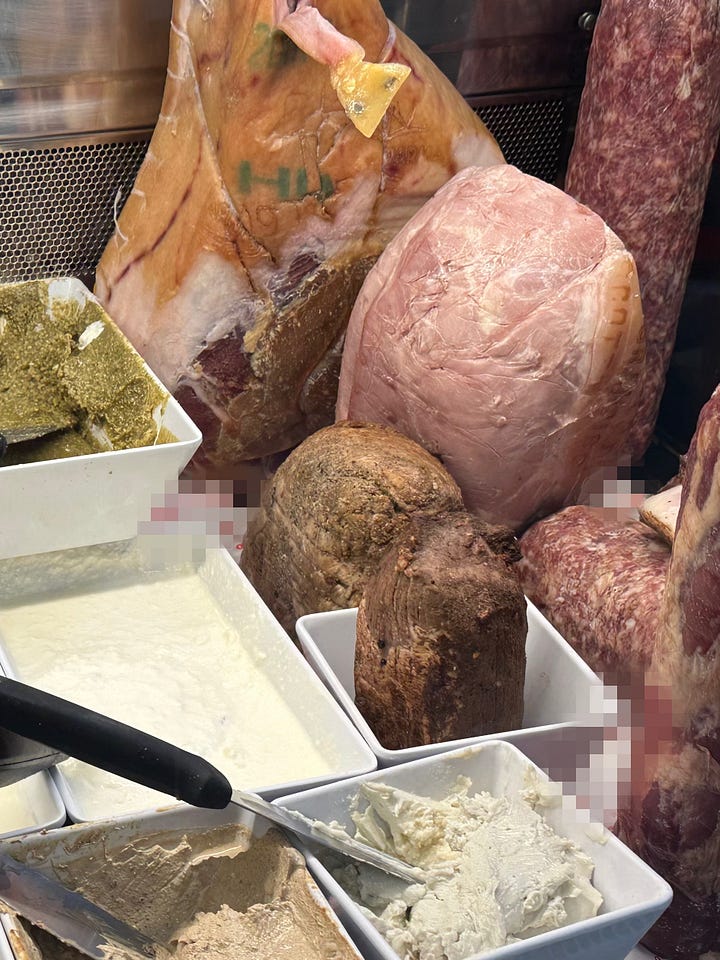
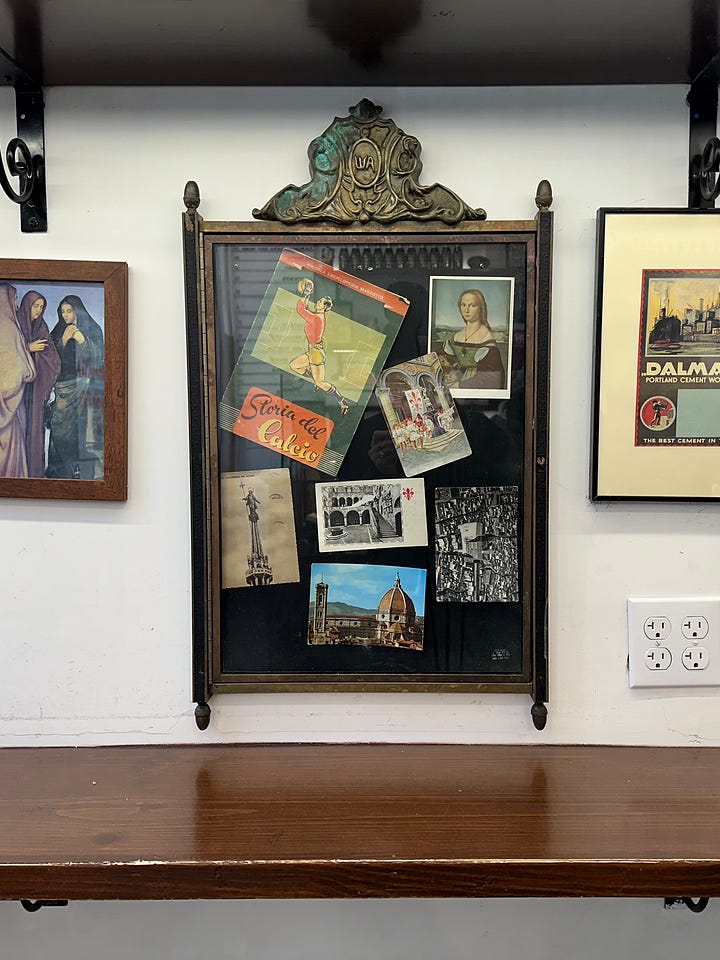
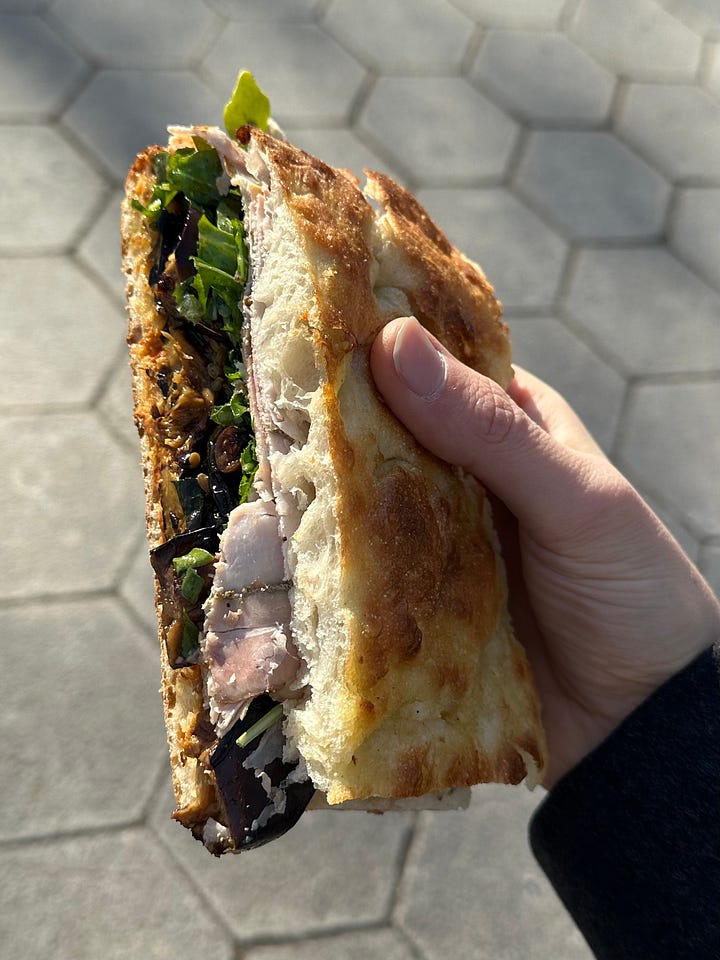
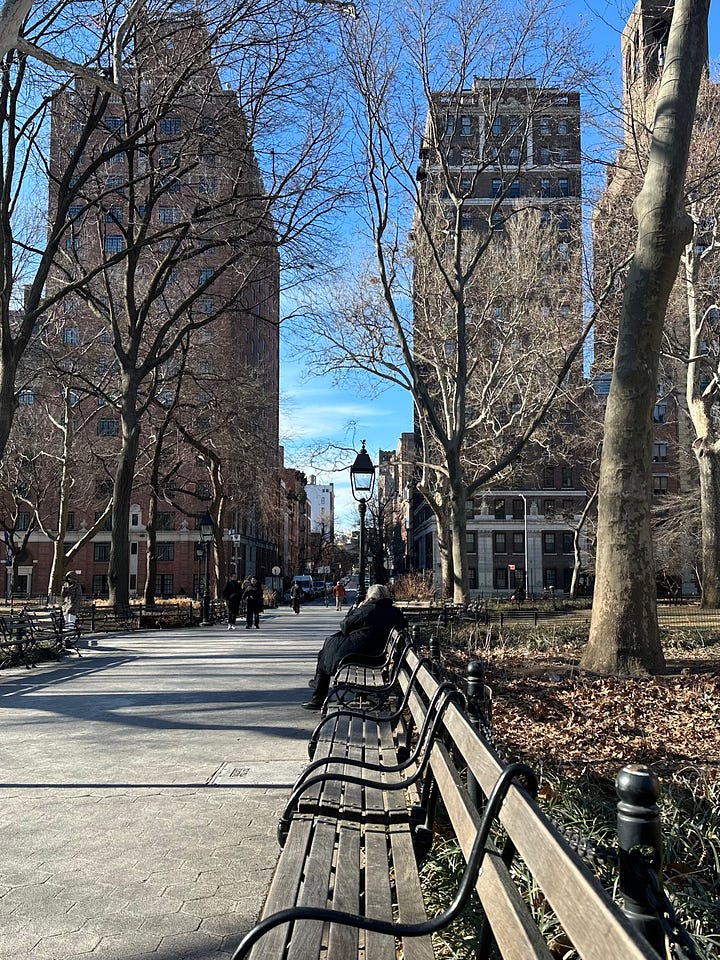
This was hands down the best sandwich I’ve had in months. Completely blew me away with the depth of flavor, the care put into all the ingredients, and most of all, the surprising place I found it. Walking near a very famous park where you may be liable to run into a swarm of college students or one of the ten thousand people filming NYC “Content”, I was expecting to only find the usual. Your okay ramen spots, casual bowl conveyor belts, fast food chains, and overpriced upper-middle echelon cloth napkin restaurants. Additionally when I found this place, it didn’t even look that promising from the outside. I rarely trust Italian places unless they look like they’ve been there since the days of Ellis Island, walls yellowed with cigar smoke and dotted with various photos of Sinatra or some guy’s cousin, it’s just in my blood to seek those out. This place however looked closer to your typical grab and go “Doordash-core” modern eatery, with bright lights, stools lining the perimeter, and pop music playing over the speakers. However, everything changed when I looked at the menu posted on the window. These weren’t my traditional pillars of Italian deli sandwich, these got freaky. Every sandwich piqued my interest, all with imported ingredients and adventurous combos. For example, the one I landed on pictured above features porchetta, ‘nduja, arugula, and spicy grilled zucchini/eggplant. How the fuck could I say no to that? The thing that gave me caution however was the price. My sandwich was listed at $17, and visions of premium ingredients shoved into a shitty, tiny ciabatta roll flashed through my head. I’ve been duped before. However when the time came to order, my sandwich was assembled on 2 pieces of freshly baked golden schiacciata bread that resembled Moses’ commandments tablets. The above picture is just one half of what I got. It’s very rare you get a sandwich above $15 that actually feels worth it, but this truly justified the price. I happily took my giant slab of Italian glory to the park and demolished it. This is what a sandwich is supposed to be. A big, complicated but simple, olive oil dancing on the roof of your mouth, crumbs and salt popping off the surface of the bread with every bite, eat it off the fucking wax paper on a park bench SANDWICH. This place reminded me that just because somewhere looks modern, doesn’t mean you can’t get a traditional experience.
9/10
⫘⫘⫘⫘⫘⫘⫘⫘⫘⫘⫘⫘⫘⫘⫘⫘⫘⫘⫘
Keep reading with a 7-day free trial
Subscribe to A Guy Not A Newsletter to keep reading this post and get 7 days of free access to the full post archives.





